Interview with Lingzhen Wang, editor of Chinese Women's Cinema: Transnational Contexts
The following is an interview with Lingzhen Wang, author of Chinese Women’s Cinema: Transnational Contexts.
Question: How influenced were Chinese women directors by the sexual revolution happening in the ’70s in the Western world?
Lingzhen Wang: Not that much at the time because in Mainland China socialist ideology was prevalent from 1949 to the very end of the 1970s, during which little contemporary Western feminist or women’s movements were introduced. Although Hong Kong and Taiwan were more open to the West at the time, there were simply few women directors. Tang Shu Shuen was probably the only person who was influenced by some Western gender ideas. She left Taiwan for the University of Southern California for her undergraduate education, and returned to Hong Kong, her childhood home, in 1969. Indeed, her first film, The Arch (1970), centers on women’s desire and sexuality in the context of traditional Chinese chastity.
Q: In a world where Hollywood is forever reappropriating existing properties for remakes or sequels, why hasn’t Chinese cinema been taken up in this way as much as other Asian cinema?
LW: Chinese film industries in the Mainland, Taiwan, and Hong Kong have their own rich traditions of remaking. For example, one of the best Hong Kong martial arts films, New Dragon Inn (1992), is a remake of the 1967 Taiwan martial arts film, Dragon Inn. Recently, Jet Li has joined director Tsui Hark for a 3-D remake of the 1992 film, called New Dragon Gate Inn. For another example, during socialist China, especially between the late 1960s and the early 1970s, many of the modern model operas were remakes of previous socialist feature films. Since the 1990s, there has appeared another wave of remaking of socialist red classics both in film and on TV.
Q: What directors do you think have had the greatest influence on Chinese women directors
LW: Chinese women directors number over 100, and they come from different geopolitical locations (Mainland China, Hong Kong, Taiwan, and the diaspora) and different historical periods. There is simply no way to pin down a group of directors who could be regarded as the most influential to all Chinese women directors. In other words, the influences Chinese women directors have received are diverse and beyond a limited group of people. The French New Wave movement, for example, which helped initiate new waves in all three Chinese communities (Mainland, Taiwan, and Hong Kong), played a significant role in the emergence of two great women directors from Mainland China and Hong Kong, Zhang Nuanxin and Ann Hui, in the late 1970s and early 1980s. But for the first Taiwanese woman director, Ch’en Wen-min, Chinese traditional drama and local theater shed more direct influence on her filmmaking in the late 1950s and 1960s.
Q: Why is war and traditional women’s issues such a prevalent theme in Chinese women’s cinema?
LW: First of all, let me modify the question a bit. It is not very accurate to state that war and traditional issues constitute prevalent themes of Chinese women’s cinema, because other issues concerning modernity, women’s private and public identities, and commercial and popular cultures are equally significant in Chinese women’s cinema.
Second, if war often appears in one way or another in some of the films directed by Chinese women directors, this tendency stems mostly from modern Chinese history rather than from women directors’ particular preferences. In other words, because modern Chinese history, from 1911 to 1949, was very much a battleground for both international wars and civil wars, films set in those years cannot avoid the turbulent historical background.
Third, traditional gender ideals and concepts have long evolved along the modern path in both Chinese and other contexts. In different films, “traditional issues” have appeared to be quite different and in relation to different modern demands. Chinese women’s cinematic practice is understood better if we see it as a constant negotiation with both the traditional and modern (as well as Chinese and Western) ideas and ways of representation.
Q. Is there an up-and-coming Chinese woman director that is making an impact now?
LW: That depends on how we define “impact.” If we are talking solely about commercial effect, not many Chinese women directors have demonstrated particular talents or strength in the area, although some of their films could be considered commercially successful. If we understand impact more in terms of artistic styles, alternative visions, and/or gendered practice, in addition to a general appeal to the audience, the following young directors are only three among many who have made significant contributions to Chinese filmmaking: Zero Chou from Taiwan, Yan Yan Mak from Hong Kong, and Li Yu from Mainland China. While they are known for their cutting-edge experimental films, these three directors have also made successful mainstream and commercial films.





